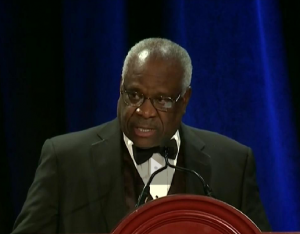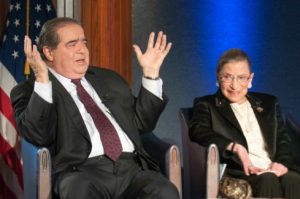Justice Thomas on Antonin Scalia
He spoke to us about Winston Churchill in San Francisco in 2009. Ever since, I have sought out the uncommon speeches of Justice Clarence Thomas. Invariably I find them moving, eloquent, and instructive on things I haven’t considered sufficiently.

Such was his November 2016 tribute to Antonin Scalia, given to the Federalist Society. He began with examples of the late Justice’s wit (beloved alike by Justice Thomas and Justice Ruth Bader Ginsburg. Respectively, they agreed with Scalia most of the time—and little of the time.):
In PGA Tour vs. Martin [Scalia] wrote: “I am sure that the framers of the U.S. Constitution aware of the 1457 edict of King James II of Scotland, prohibiting golf because it interfered with the practice of archery, expected that sooner or later the paths of golf and government, the law and the links, would once again cross, and that the judges of this August Court would some day have to wrestle with the age-old jurisprudential question for which their years of study in the law have so well prepared them: Is someone riding around a golf course from shot to shot really a golfer?”
And we will not soon forget Justice Scalia’s rebuke of legislative history in Chisholm vs. Roemer. There the Court reasoned that the absence of legislative history could be likened to the dog that didn’t bark. Justice Scalia responded: “Apart from the questionable wisdom of assuming that dogs will bark when something important is happening… In ascertaining the meaning of a statute, a court cannot in the manner of Sherlock Holmes pursue the theory of the dog that didn’t bark. We are here to apply the statute, not the legislative history… Statutes are the law, though sleeping dogs lie.”
The Heart of Thomas’s Message
For decades in cases large and small, Justice Thomas continued, “Justice Scalia delighted us with his with his command of the English language.” Then he got down to the more profound things he had come to say about his friend:
Much may be said about him, but little needs to be said for him…. I can hear his voice. “What do you think is the reason America is such a free country? If you think that what sets us apart is the Bill of Rights, you’re crazy…. The Bill of Rights for the former evil empire, the USSR, was much better than ours.” He would then make his point. “Without the structural constraints that the Constitution places on government power, the Bill of Rights is just words on paper.”

The separation of powers, Scalia wrote, “may prevent us from righting every wrong—but it does so to ensure that we do not lose liberty.” Thomas then quotes James Madison, from across the centuries:
“If angels were to govern men, neither external nor internal controls on government would be necessary. In framing a government which is to be administered by men over men, the great difficulty lies in this: you must first enable the government to control the governed; and in the next place oblige it to control itself.” —Federalist 51
C-Span’s five-minute précis of Justice Thomas’s speech can be heard, and a rough transcript of his text, can be had by clicking here.
For those willing to devote a little more time to this learned man, click here. (Scroll to minute 20 for the speech proper.)







2 thoughts on “Justice Thomas on Antonin Scalia”
I’m not sure of her context there, since someone who visited with him often is likely to have shared his famous sense of humor. But collegiality among political or philosophic opposites, a lost Churchillian art, is so rare these days as to be worthy of notice, and example.
It’s pleasing fiction that makes us feel better about our politics to cite the friendship between Ginsburg and Scalia, but the justice was barely cold and Ginsburg looked back on a series of 4-4 splits that favored the left, saying with ghoulish glee, “Think what would have happened had Justice Scalia remained with us.” I’ve never been glad a good friend of the sort you described had died ’cause he or she didn’t vote my way. I have been privileged to have dinner with Justice Thomas on multiple occasions. I can tell you for certain he loved Scalia more, and certainly didn’t just see him as a vote.
Comments are closed.